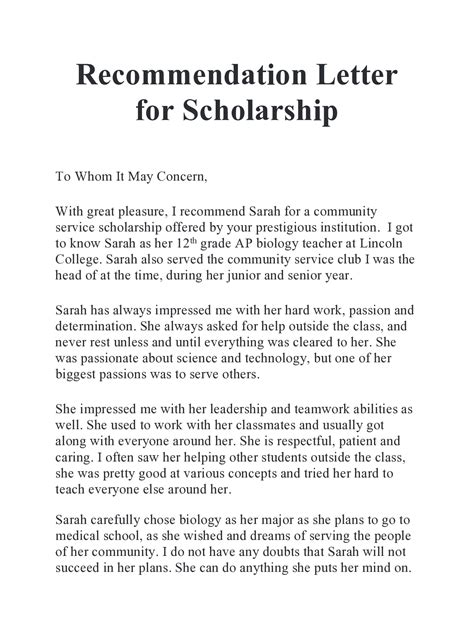Introduction

The pursuit of higher education can be a transformative journey that requires unwavering determination, academic excellence, and financial resources. For many students, scholarships serve as a vital lifeline, enabling them to overcome financial barriers and unlock their full potential. A compelling letter of reference can significantly enhance a student’s scholarship application, providing a glimpse into their character, abilities, and motivations.
Structure and Content
A well-structured letter of reference should include the following elements:
-
First Paragraph:
- Introduce the student and state your relationship to them (e.g., professor, mentor, counselor).
- Briefly highlight their academic achievements and personal qualities.
-
Second Paragraph:
- Describe specific examples of the student’s intellectual capacity, analytical skills, and work ethic.
- Provide evidence of their ability to engage with challenging academic coursework and achieve outstanding results.
-
Third Paragraph:
- Discuss the student’s leadership qualities, communication skills, and involvement in extracurricular activities.
- Highlight their ability to collaborate with others, inspire their peers, and make meaningful contributions to the community.
-
Fourth Paragraph:
- Address the student’s suitability for the specific scholarship they are applying for.
- Explain how their qualifications and aspirations align with the scholarship’s criteria and objectives.
-
Closing Paragraph:
- Express your enthusiastic recommendation of the student for the scholarship.
- Summarize their strengths and reaffirm your belief in their potential to succeed in higher education.
Tips for Writing an Effective Letter of Reference
-
Be Specific and Avoid Clichés: Use concrete examples and anecdotes to illustrate the student’s qualities rather than relying on generic phrases.
-
Provide Relevant Context: Explain the context of the student’s academic or extracurricular experiences, such as the level of coursework or the scope of their involvement.
-
Use Active Voice: Write in the active voice to convey a sense of confidence and authority.
-
Proofread Carefully: Ensure that your letter is free of grammatical errors and typos.
-
Keep it Concise: Aim for a length of 250-350 words to maintain the reader’s attention.
Benefits of a Strong Letter of Reference
According to the National Association of Student Financial Aid Administrators (NASFAA), a strong letter of reference can have the following benefits:
-
Increased Scholarship Eligibility: Scholarships often have rigorous selection criteria, and a compelling letter of reference can help students meet these requirements.
-
Enhanced Credibility: Letters of reference provide independent validation of a student’s achievements and personal qualities, adding credibility to their application.
-
Increased Confidence: Students with strong letters of reference are more likely to believe in their own abilities and pursue their educational goals with greater determination.
Frequently Asked Questions (FAQs)
1. Who should write my letter of reference?
Consider individuals who have witnessed your academic accomplishments, leadership qualities, or personal growth, such as professors, mentors, counselors, or employers.
2. How many letters of reference do I need?
Most scholarships require two or three letters of reference, but check the specific requirements for each one.
3. Can I request a letter of reference from a family member or friend?
While family members and friends may have valuable insights, it is generally not recommended to ask them to write your letter of reference for a scholarship application.
4. How far in advance should I ask for a letter of reference?
Give your writers ample time to complete the letter, typically 2-4 weeks.
5. Can I review my letter of reference before it is submitted?
In most cases, it is considered ethical to ask to review your letter of reference before it is submitted. However, some letter writers may prefer to send their letter directly to the scholarship committee.
6. What if I don’t have anyone who can write me a letter of reference?
If you cannot find anyone to write a letter of reference, consider reaching out to your school counselor or a community leader who has observed your work or character.
7. How do I submit my letter of reference?
Follow the instructions provided by the scholarship committee. They may request the letter to be submitted online, mailed, or emailed.
8. How can I express my gratitude to my letter writers?
A handwritten thank-you note or a small gift is a thoughtful way to show your appreciation for their time and support.
Conclusion
The power of a well-written letter of reference for a student scholarship cannot be overstated. By providing a comprehensive overview of the student’s strengths and potential, you can increase their chances of success in obtaining financial assistance for higher education. Follow the tips and advice outlined in this guide to craft a compelling letter that will help your student stand out from the crowd.
